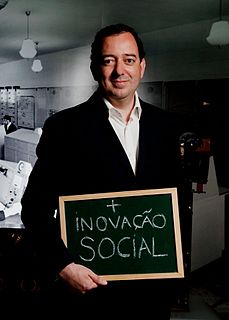A Quote by Neil deGrasse Tyson
Spin-off technologies are changing the culture. Even if you don't become an engineer you could be a poet, a journalist, a lawyer, but you will be thinking innovation and your actions within society, who you vote for, what you value, all become a participant in an innovation economy.
Related Quotes
Once you have an innovation culture, even those who are not scientists or engineers - poets, actors, journalists - they, as communities, embrace the meaning of what it is to be scientifically literate. They embrace the concept of an innovation culture. They vote in ways that promote it. They don't fight science and they don't fight technology.
In the eighties and nineties, the innovation agenda was exclusively focused on enterprises. There was a time in which economic and social issues were seen as separate. Economy was producing wealth, society was spending. In the 21st century economy, this is not true anymore. Sectors like health, social services and education have a tendency to grow, in GDP percentage as well as in creating employment, whereas other industries are decreasing. In the long term, an innovation in social services or education will be as important as an innovation in the pharmaceutical or aerospatial industry.
We can't have extraordinary dynamism, innovation, and change in the economy and expect to have predictability and stability in our personal lives. It's not as if there are these big, giant institutions existing between us and the economy. In fact, these institutions have become tissue-thin. There is no mediation anymore. We are the economy; the economy is us.
The paramount doctrine of the economic and technological euphoria of recent decades has been that everything depends on innovation. It was understood as desirable, and even necessary, that we should go on and on from one technological innovation to the next, which would cause the economy to "grow" and make everything better and better. This of course implied at every point a hatred of the past, of all things inherited and free. All things superceded in our progress of innovations, whatever their value might have been, were discounted as of no value at all.
The changing styles are the expression of a restless search for something which shall commend itself to our aesthetic sense; but as each innovation is subject to the selective action of the norm of conspicuous waste, the range within which innovation can take place is somewhat restricted. The innovation must not only be more beautiful, or perhaps oftener less offensive, than that which it displaces, but it must also come up to the accepted standard of expensiveness.
Both SOPA and PIPA are toxic. My view is that anyone who supports these bills either doesn't understand what they are supporting or is simply no friend of innovation. And, if you are no friend of innovation, I can't support you in any way, as innovation is the lifeblood of our economy, our country, and what I've dedicated my life to.
Carefully watch your thoughts, for they become your words. Manage and watch your words, for they will become your actions. Consider and judge your actions, for they have become your habits. Acknowledge and watch your habits, for they shall become your values. Understand and embrace your values, for they become your destiny.
Leapfrog innovation - consistent, constant, ridiculous leapfrog innovation - only happens within a dictatorship. Any time you try to do something really innovative, most people aren't going to understand it until after they experience it. So when you're developing in innovation, you have to be a dictator.
One of the basics of a good system of innovation is diversity. In some ways, the stronger the culture (national, institutional, generational, or other), the less likely it is to harbor innovative thinking. Common and deep-seated beliefs, widespread norms, and behavior and performance standards are enemies of new ideas. Any society that prides itself on being harmonious and homogeneous is very unlikely to catalyze idiosyncratic thinking. Suppression of innovation need not be overt. It can be simply a matter of peoples walking around in tacit agreement and full comfort with the status quo.
Instead of the primitive raw material economy, we will create a smart economy generating unique knowledge, new useful things and technologies. Instead of the archaic society, in which the leaders think and make decisions for everyone, we will become a country of intelligent, free and responsible people.




































